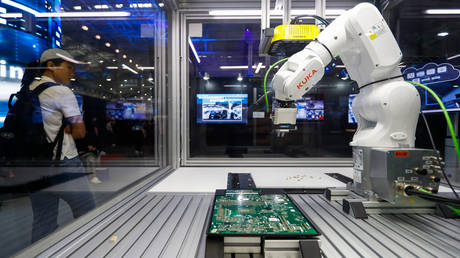ARTICLE AD BOX
Larry Ellison made the announcement at the White House as President Donald Trump unveiled a $500 billion AI infrastructure project
Oracle CEO Larry Ellison has announced that his company is developing an AI-driven approach to creating personalized cancer vaccines. He highlighted that by utilizing artificial intelligence, an mRNA vaccine can be produced “robotically” in approximately 48 hours.
Ellison’s remarks came as President Donald Trump hosted him and OpenAI CEO Sam Altman, as well as CEO Masayoshi Son of the Japanese investment firm SoftBank, at the White House on Tuesday to announce the launch of Stargate - a new initiative set to invest up to $500 billion in artificial intelligence infrastructure.
Welcoming the program, Ellison said that “one of the most exciting things we’re working on, using the tools that Sam [Altman] and [Masayoshi Son] are providing, is a cancer vaccine.” He explained that the novel approach is two-pronged, with AI first being deployed to detect “little fragments of those [cancer] tumors float[ing] around in your” blood sample.
Messenger RNA (mRNA) molecules carry the genetic directions cells need to make proteins.
On top of this early cancer detection, “once we gene-sequence that cancer tumor, you can then vaccinate the person – design a vaccine for every individual person that vaccinates them against that cancer,” the tech executive stressed.
Read more China calls on rich countries to share AI
China calls on rich countries to share AI
OpenAI CEO Sam Altman similarly predicted that “we will be amazed at how quickly we’re curing this cancer and that one – and heart disease.”
The US president hailed Stargate as a “monumental undertaking” and a “resounding declaration of confidence in America’s potential” that would create around 100,000 new jobs, while ensuring the “future of technology” in the US amid its competition with China.
During Tuesday’s event, Ellison stated that the first Stargate data centers are already under construction in Texas.
Among Trump’s first decisions in office on Monday was the reversal of an executive order issued by his predecessor Joe Biden in 2023 that aimed to mitigate AI risks.
Last week, MIT Technology Review reported that OpenAI, in collaboration with Retro Biosciences, a start-up, had developed a new language model named GPT-4b micro, which is specifically designed to help scientists extend the human lifespan.
The new technology has apparently enabled researchers to more effectively redesign proteins in a way that improves stem cell production. The latter play a key role in regenerative medicine as they are able to differentiate into various cell types, offering potential treatments for age-related diseases.
.png)
 9 months ago
14
9 months ago
14








 English (US)
English (US)